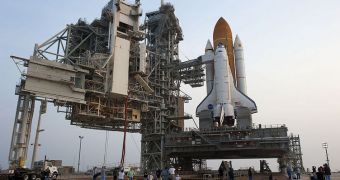Biotechnology pioneer Amgen and Brussels, Belgium-based biopharmaceutical company UCB are working together to analyze the efficiency of a new antibody against bone loss. The condition is affecting all astronauts doing space exploration, regardless of how much time they spend in orbit.
During the last shuttle flight ever – Atlantis' STS-135 mission to the International Space Station (ISS) – the four astronauts aboard the orbiter will conduct a series of studies of the chemical, including a pre-clinical test of the sclerostin antibody.
The results will help the two companies refine their research even further. In order to conduct the new research, the collaboration enlisted the help of experts from the NASA Ames Research Center (ARC).
Atlantis is scheduled to launch carrying the Amgen/UCB experiment on July 8, but it would now seem that this date may slip later into the week. Weather officials at the Kennedy Space Center (KSC), in Florida, say that there is 60 percent change of bad weather on Friday.
Regardless of when the orbiter launches, the experiment will still be on board. Scientists are very interested in this line of work, as are space agencies around the world. As space exploration is becoming more and more popular, keeping astronauts safe in space is becoming a major challenge.
Even the rigorous work-out routine that astronauts aboard the ISS have to complete every day cannot prevent the loss of bone and muscles that microgravity causes. Upon returning to Earth, space flyers need to conduct a series of rehabilitation sessions.
The new study will be conducted on mice. The STS-135 astronauts will inject the animals with the antibody, in order to assess how the rodents' bones will respond to microgravity afterwards. Only half of the mice Atlantis will carry will be given the antibody.
An additional group of mice is left on the ground. When Atlantis returns, all of the data covering the three groups will be compared. Experts will mostly focus on aspects such as the structure, composition, strength, and cell and molecular nature of the bones, SpaceRef reports.
“It is an honor to work with NASA on this historic final mission,” Amgen scientific executive firector Chris Paszty, PhD, says.
“This proof of principle study will enhance our understanding of the science behind the sclerostin antibody and arm us with important research to support potential future therapeutic applications in both astronauts and patients suffering from bone loss,” he adds.
“We are very excited to be working on this momentous experiment. It will help us to better understand the sclerostin antibody,” adds UCB chief medical officer, professor Iris Loew-Friedrich. The expert is also the executive vice president of Global Projects and Development at the company.
“This fascinating approach of turning genetic discovery into novel and innovative drug development seems fitting to the collaboration with NASA whose mission is exploration and discovery,” the official concludes.

 14 DAY TRIAL //
14 DAY TRIAL //